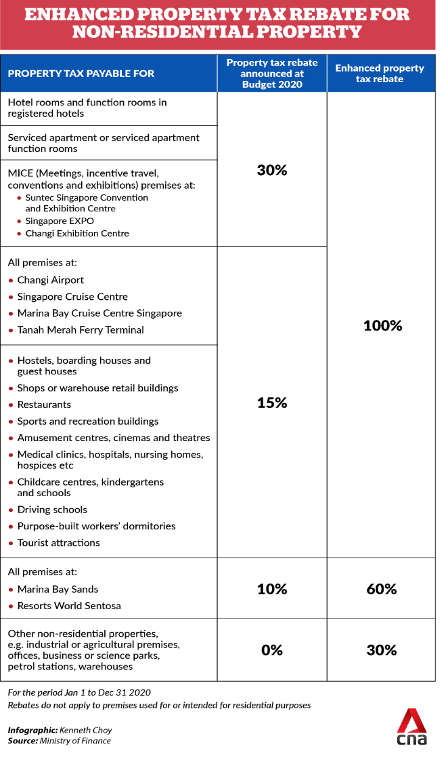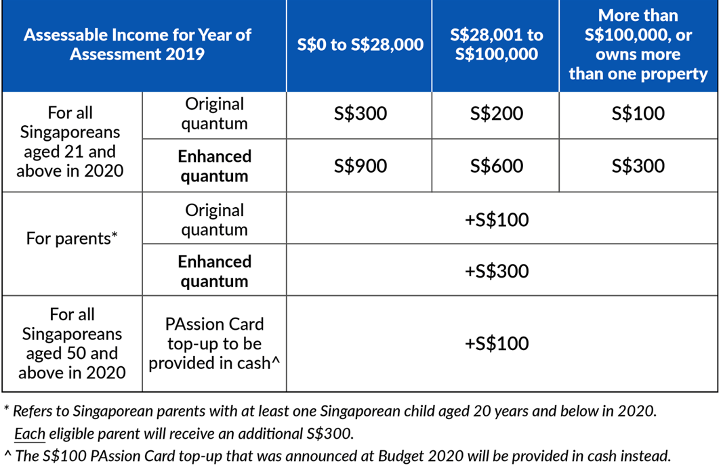COVID-19, believed to be one of the worst economic contractions since Singapore’s independence has hit home hard. An economy that rose to its glory days due to her attractive social, economic and political climate now faces a very real threat. From the tourism industry to the real estate market, tremors are felt, some stronger than others. Rising up to the situation, the Singapore government has unleashed several bouts of relief packages, assisting not only its people but to cushion the impact on businesses as well. But how do these packages aid you? In this article, we will dive into the effects of the impending economic downturn and how the announced relief packages could be beneficial to you during this time of uncertainty.
Property owners dabbling in hospitality and tourism-related businesses are caught at a dead end. With close to zero incoming tourists and fear-stricken locals, hotels, resorts and several luxury retail malls such as Marina Bay Sands are struggling to make ends meet. This makes it difficult for tenants to afford the usual rent repayments. Should property owners remain unbending with rent repayments, desperate tenants pushed to an extreme would wind up, lowering overall rental fees collected and increasing property vacancy rates. To tackle this, here are some of the measures introduced as part of the Resilience Budget 2020 targeted at tiding businesses through these challenging times:
Key Measure: Lowering Tax Payable (updated as of 26 March 2020)
For 3 months, businesses across all industries will be relieved from corporate and income tax payables until July 2020. This measure was introduced in order to buy time for businesses to make necessary adjustments should cash flow be an issue due to the massive loss in business profits. Under the Resilience Budget, all businesses will receive tax rebates, with certain industries privileged with more depending on the severity. As property investors are confronted with the reality of slowing business activities and lower rental yield, the reduction in tax payables would maintain decent levels of returns on investment. Below displays the tax rebate allocation based on industry:
Another hit to the property market might just be on its way. With businesses activities slowing tremendously, cutting lean and minimising cost would eventually be a go-to temporal solution. This puts many individuals at risk of being retrenched in such economic duress, especially those in lower-skilled job positions. This could spell both good news and a disaster for investors in the real estate market.
With more people who are vulnerable to retrenchment, some may not be able to sustain the cost of existing living conditions (i.e mortgage, loans) should the virus persist for an extended duration. As such, they may default on payments and rental fees, which can cause a disruption in income streams for property owners/investors. Conversely, cash wealthy investors may seize this opportunity to snatch up good deals on the market. As mentioned in our previous article, times of calamity could prove to be opportune moments for value investing.
Even if you are not an investor in the property market, this article is not a lost cause for you. The Resilience Budget and Care Package Budgets are released with the main intention to tide Singaporeans thru, for workers and family expenses alike. We will take you through some of the prominent relief packages that you could be eligible for:
Target Group #1: Workers affected by the Pandemic
With more than a third of the Resilience Budget allocated to sustaining jobs and supporting workers, the government has announced that its initiative to raise its involvement in the co-sharing of wages for every local worker, from a previous 8% to a new high of 25%.
For industries that are hit severely by the virus outbreak such as the tourism and its related industries, co-sharing of wages would be significantly higher, with food industries and aviation/tourism-related industries benefitting 50% and 75% respectively. This is to ensure that businesses are still able to survive through the impending recession. An estimated $15.1 Billion will be spent.
| Businesses supported | JSS will provide support of: | |
| Tier 1 – Aviation and Tourism | – Airlines
– Airport ground handlers – Airport operators – Qualifying licensed hotels – Qualifying licensed travel agents – Qualifying gated tourist attractions – Cruise lines and cruise terminal operators – Purpose-built meetings, incentives, conferences and exhibitions venue operators |
75% of the first $4,600 of gross monthly wages per local employee (includes 25% base support) |
| Tier 2 – food services | – Licensed food shops and food stalls (including hawker stalls) | 50% of the first $4,600 of gross monthly wages per local employee (includes 25% base support) |
Target Group #2: Self-employed Individuals under SIRS
Additionally, under the Resilience Budget, an estimated 88,000 self-employed individuals will be eligible for this budget payout, receiving $3,000 in payouts over 3 months in May, July and October. Self-employed individuals include taxi-drivers, freelancers and more, with the condition that (a) their Net Trade Income is of no more than $100,000, (b) they are living in a property with an annual value of no more than $13,000 and (c) they do not own two or more properties. An estimated expenditure of $1.2 Billion is incurred.
Target Group #3: Households and families
A second line of support for households and families comes in the form of the Care and Support Package. Depending on your income assessment, you will be eligible for the respective one-off cash payout. For parents with children below aged 21 will further receive an additional $300 to offset the cost of living expenses.
Residents aged 50 and above will also benefit from a one-off $100 cash payout that is originally intended to offset transportation costs.
If you are aged 21 and above living in a 1 or 2-room HDB flat with no other properties registered to your name, you will be eligible for Enhanced Grocery Vouchers worth $300, with payments staggered into 2 phases, one in 2020 and the other in 2021.
A whopping $55 Billion would be pumped back into the economy and its people, with the virus believed to last for at least another year. Fortunately, the prudence and efficient financial planning system upheld by the Singapore government could cushion Singapore’s crash, but nothing is certain anymore. As the situation evolves, so must its people. Let us all do our part to be socially responsible and aware to limit the spread of COVID-19. Stay safe!
Disclaimer: facts and figures are accurate as of 27 March 2020 and are subject to change.
Want to find the best mortgage rate in town? Check out our free comparison service to learn more!
Read more of our posts below!



